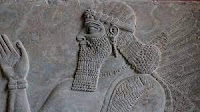God's Sovereignty over Authorities' Hearts: Five Biblical Examples
2. In Genesis 20, an almost identical situation occurred involving Abraham, Sarah, and King Abimelech; this time, after Abimelech took Sarah from Abraham, but before he could take her for a wife, the LORD came to him in a dream, warning him that he would be killed if he had relations with her. Thus, Sarah is once again returned to Abraham by divine intervention.
3. In Exodus 7-12, Pharaoh repeatedly denied liberty to the people of Israel, intending to keep them as a weakened slave-race, in subjugation to the Egyptians. But God sent severe plagues upon the Egyptians, culminating in the death of all firstborn people and animals of unbelieving households, including the death of Pharaoh's own child. Thus, Pharaoh's will was broken, and he commanded the people of Israel to leave Egypt.
4. In Daniel 4, King Nebuchadnezzar of Babylon was bragging about his own majesty and accomplishments. Presumably, he was very pleased with his state in life and planned to continue reigning, uninterrupted, as a glorious king upon the earth, commanding others to worship him as he worshiped himself. Quite suddenly, God struck Nebuchadnezzar with madness, and Nebuchadnezzar lost everything; he was reduced to living as a beast in the field. After an appointed time had passed, God restored his senses to him, and King Nebuchadnezzar worshiped God, rather than himself.
5. In Acts 9, Saul had been granted executive authority to capture and imprison Christians, for the purpose of having them sentenced to death. While Saul was "yet breathing out threatenings and slaughter against the disciples of the Lord" (Acts 9:1 KJV), the Lord appeared to him, knocked him to the ground and informed him that he was now an Christian apostle, instead of a persecutor of Christians (cf. Acts 26:12-18).
Biblical Principle
Throughout Scripture we see kings and other governmental authorities who express one intention, and yet, when He chooses, God over-rides the intentions of kings and rulers so that they end up making decisions contrary to their original intention. God rules in this way for the purpose of magnifying His glory. Our hope is not in whatever person or group that happens to be in authority, but in God, the sovereign Lord over creation, and His sovereignty extends to the intentions of those who are in positions of power.
The king's heart is like channels of water in the hands of the Lord; He turns it wherever He wishes. (Proverbs 21:1 NASB)
Labels: Bible study














0 Comments:
Post a Comment
<< Home